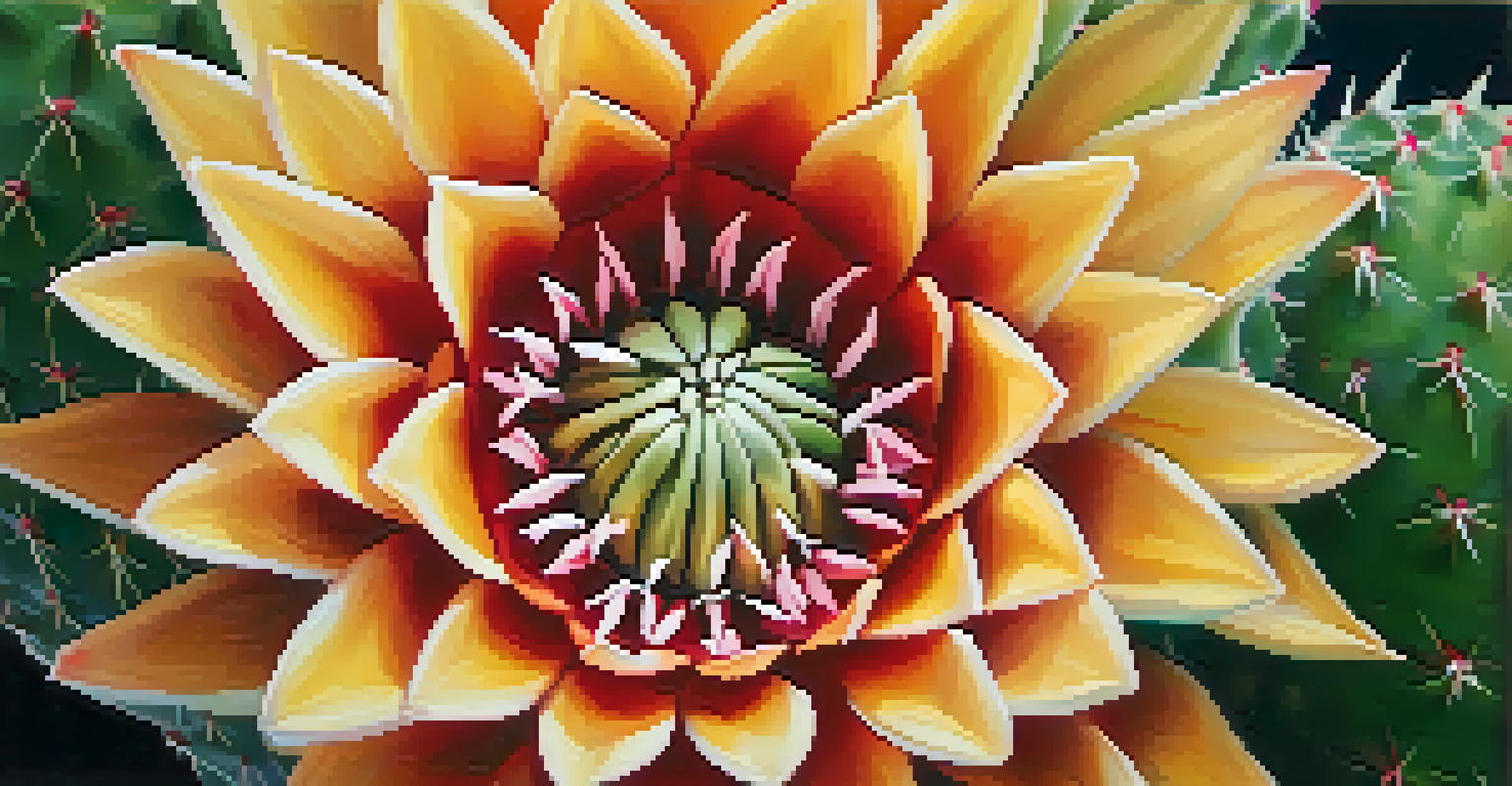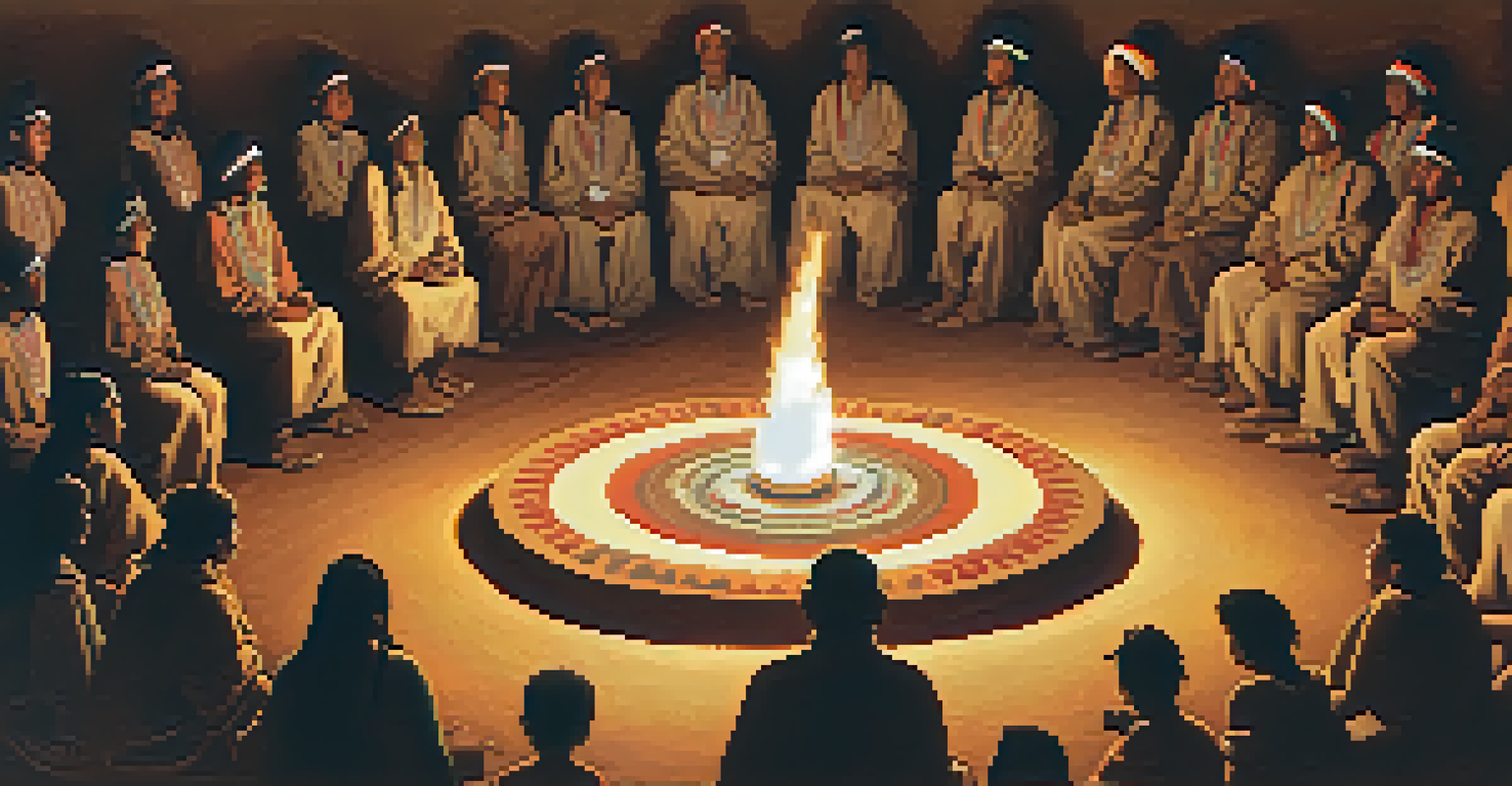Peyote's Influence on Modern Spiritual Movements

Understanding Peyote: A Sacred Plant in Tradition
Peyote, a small cactus native to Mexico and the southwestern United States, has been used for thousands of years in spiritual rituals by Indigenous peoples. Its psychoactive properties are primarily attributed to mescaline, a compound that induces profound alterations in perception and consciousness. This plant is not just a drug; rather, it is a sacred element in various ceremonies that aim to connect participants with the divine.
The use of Peyote as a spiritual guide reflects a deep relationship between nature and the divine.
In many Indigenous cultures, Peyote is viewed as a teacher that reveals insights and wisdom to those seeking spiritual enlightenment. The rituals surrounding its use often involve prayer, singing, and community bonding, creating a holistic experience that emphasizes unity and respect for nature. Understanding this context is crucial for appreciating the plant's role in modern spiritual movements.
As the world becomes more interconnected, the teachings and practices surrounding Peyote are gaining recognition beyond their traditional roots. This cultural shift raises important discussions about cultural appropriation and the ethics of using sacred plants in contemporary spirituality.
The Rise of Neo-Shamanism and Peyote
In recent years, neo-shamanism has emerged as a popular spiritual movement that draws on Indigenous practices, including the use of Peyote. This movement often appeals to those seeking alternative paths to healing and self-discovery, offering a blend of ancient wisdom and modern psychology. However, it’s essential to approach such practices with respect and awareness of their origins.

Many neo-shamanic ceremonies incorporate Peyote as a means to facilitate personal transformation and insight. Participants often report experiences of deep connection to themselves and the universe, echoing the traditional uses of the cactus. This reflects a broader trend where individuals are searching for spirituality outside conventional religious frameworks, leading them to explore ancient rituals.
Peyote's Sacred Role in Tradition
Peyote is not merely a drug but a sacred plant integral to Indigenous spiritual rituals, providing insights and fostering a connection with the divine.
While neo-shamanism can provide meaningful experiences, it also raises questions about authenticity and respect for Indigenous cultures. Striking a balance between personal exploration and cultural sensitivity is vital for those engaging in these practices.
Psychedelic Therapy: Peyote's Therapeutic Potential
Recent research has begun to uncover the potential therapeutic benefits of Peyote and other psychedelics, particularly in treating mental health issues like depression and PTSD. By inducing altered states of consciousness, these substances can facilitate profound personal insights and emotional healing. This scientific interest has sparked a renewed discussion about the place of Peyote in modern therapeutic settings.
To understand the sacredness of Peyote is to honor the traditions and teachings of those who have used it for generations.
Many practitioners and researchers advocate for a mindful approach to psychedelic therapy, emphasizing the importance of set (mindset) and setting (environment). When used correctly, Peyote can serve as a catalyst for healing, providing individuals with clarity and a greater understanding of their life's challenges. This aligns with the traditional views of Peyote as a spiritual teacher.
However, integrating Peyote into mainstream therapy requires careful consideration of ethical implications and potential risks. As more people explore its therapeutic potential, it is crucial to ensure that these practices honor the plant's cultural significance while providing safe and effective treatment options.
Peyote and Environmental Consciousness
Peyote's use in spiritual practices has also inspired a growing movement towards environmental consciousness. Many modern spiritual seekers who engage with Peyote often advocate for sustainable practices and greater respect for the Earth. This connection to nature echoes the traditional Indigenous beliefs that emphasize harmony with the environment.
As people experience the profound effects of Peyote, they often report a heightened awareness of ecological issues and a desire to protect the natural world. This has led to a surge in activism focused on environmental protection, sustainability, and conservation efforts among those who partake in Peyote rituals. It highlights how spiritual experiences can inspire real-world action.
Neo-Shamanism and Cultural Sensitivity
The rise of neo-shamanism highlights the need for respect and understanding of Indigenous practices when incorporating Peyote into modern spiritual journeys.
Moreover, the environmental impact of Peyote harvesting poses challenges that need addressing. Conversations about sustainable practices in cultivation and harvesting are becoming increasingly important to ensure that this sacred plant continues to thrive for future generations.
Cultural Appropriation and Ethical Considerations
As Peyote gains popularity in modern spiritual movements, the issue of cultural appropriation becomes a significant concern. Many Indigenous communities view the use of Peyote outside its traditional context as a form of disrespect that undermines its sacred value. It's crucial for those exploring Peyote in their spiritual practices to recognize and honor its cultural significance.
Understanding the historical and cultural background of Peyote can help individuals engage with it more responsibly. This includes seeking guidance from Indigenous voices and communities, participating in educational events, and supporting Indigenous rights. Such actions foster a respectful dialogue about the plant and its uses.
Navigating the fine line between appreciation and appropriation can be challenging, but it is necessary for maintaining the integrity of these ancient practices. Engaging authentically with Indigenous cultures requires humility and a commitment to honoring their traditions.
Contemporary Spirituality: Blending Traditions
Modern spirituality often involves blending various traditions, and Peyote plays a notable role in this synthesis. Individuals may incorporate elements from Indigenous spirituality, Eastern philosophies, and even Western psychological practices into their spiritual journeys. This eclectic approach can enrich personal practices but also raises questions about the authenticity of these blended traditions.
The appeal of such a diverse spiritual practice lies in its ability to cater to individual needs and preferences. Peyote, with its deep-rooted history, offers a unique avenue for exploration, inviting people to experience altered states of consciousness and connect with their spirituality. However, it's essential to remain aware of the origins and significance of each element being integrated.
Therapeutic Potential of Peyote
Recent research suggests that Peyote may offer therapeutic benefits for mental health, emphasizing the importance of cultural awareness in its modern use.
As spirituality continues to evolve, the conversations around blending traditions will likely grow. This invites an ongoing dialogue about respecting the roots of practices while exploring new avenues for personal growth and understanding.
The Future of Peyote in Spiritual Practices
Looking ahead, the future of Peyote in modern spiritual practices is likely to be shaped by ongoing dialogue around cultural sensitivity, therapeutic research, and environmental sustainability. As interest in psychedelics grows, Peyote may find itself at the forefront of discussions about healing, spirituality, and connection to nature. This evolution presents both opportunities and challenges.
The integration of Peyote into various spiritual practices will require a commitment to understanding its cultural roots and ethical considerations. Balancing personal exploration with respect for Indigenous traditions will be crucial for those drawn to its use. This ongoing journey invites a deeper exploration of spirituality in a contemporary context.

Ultimately, the future of Peyote will depend on how individuals and communities choose to engage with its rich heritage. By fostering a culture of respect and awareness, Peyote can continue to serve as a powerful tool for spiritual exploration and healing.